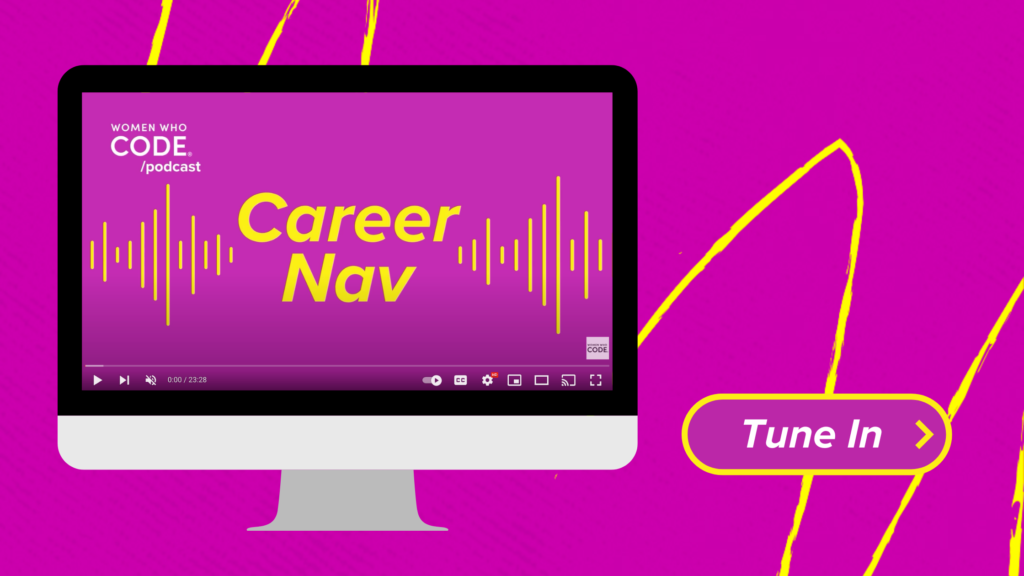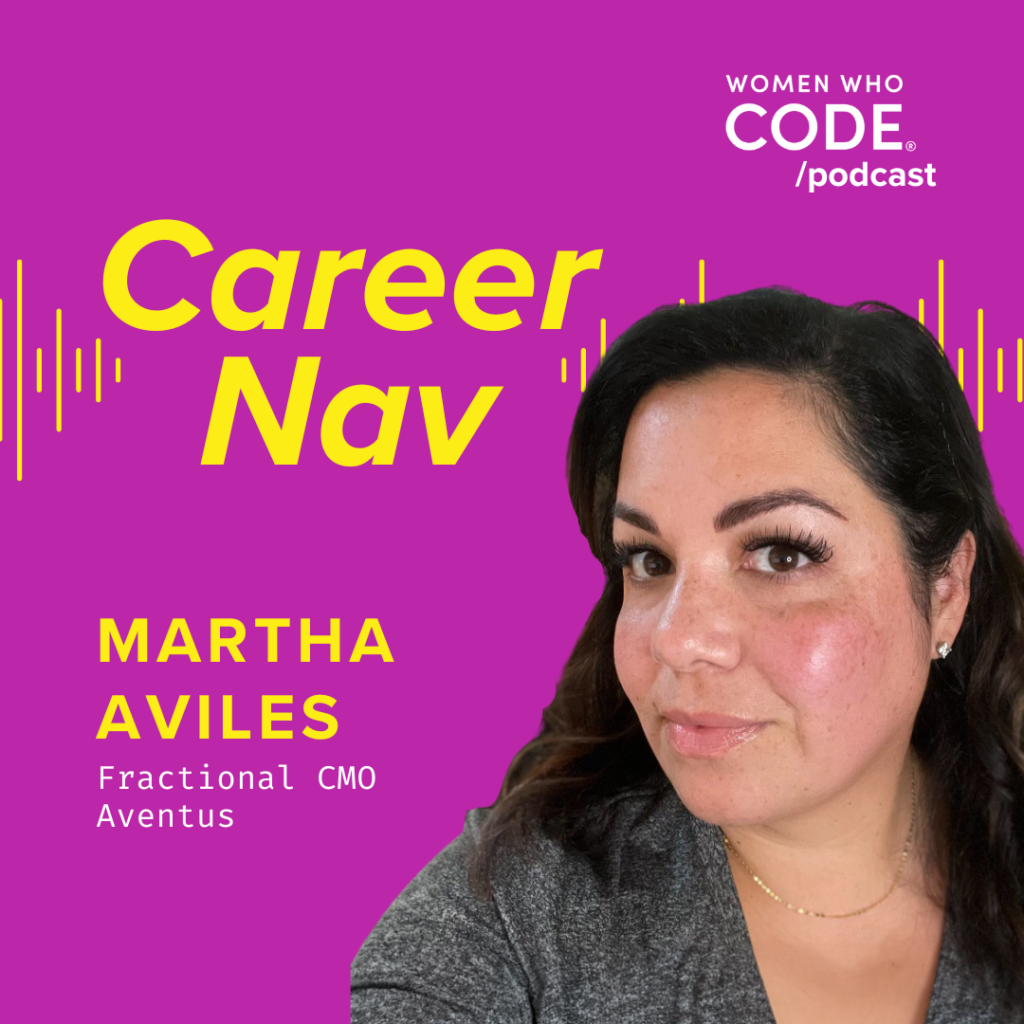Career Nav #83: Breaking the Glass Ceiling as a Latina First Gen in Tech/Web3
Written by Martha Aviles
This article is adapted from the recording of Career Nav #83.

Grecia Castaldi, Director of Community at Women Who Code, sits down with Martha Aviles, CMO at Aventus. Martha shares her exposure to tech, how it was always the path for her, her challenges as a Latina woman, and her advice to others on overcoming those challenges.
What was your childhood like, what first inspired you about STEM, and why did you think about making it a career?
We moved a lot. I’ve lived in Texas, Florida, and California. My dad is an engineer. I don’t know about other children of immigrants, but in my house, it was very much like you had to be a lawyer, doctor, or engineer. Those were pretty much your only choices, according to my parents. My dad was always pushing me into engineering. I work in tech because I grew up around it, and I’m very comfortable with it.
Can you talk about the intersection of marketing and tech and how that’s played a role in your career over the years?
I live in Austin, Texas. Austin is known for its tech startup scene. I always wanted to work in tech. The great thing about marketing is that everybody needs it. You must understand your customer, their pain points, and how you can increase awareness about your brand and products. The other cool thing I’ve seen over the last 20+ years is that marketing is evolving. We’ve become more tech-focused, and so many great tools are out there. It’s been really fun to see those two things crossover. I’ve been in high-tech for a long time, and now I feel like marketing has gotten very high-tech.
What were your academic experiences, and why did you decide to go for your MBA?
Education is important. I’m a lifelong learner. I love learning, and I thought I wanted to be a CEO. I say thought because I could still be a CEO one day, but I’m not as set on it. My MBA will help me tremendously. I also am very aware of my skin tone and my hair color. Getting an MBA was a way to buy a card so that I could play it if I ever needed to play it. People respect McCombs University of Texas Business School, and so that’s why I decided to go there and get my MBA.
What has continued to draw you to tech companies over the years? Were there some projects or accomplishments that you want to share that you are particularly proud of?
My dad was an engineer in the mid-’90s. We had multiple computers in our home, and we were not well off by any means; it was just that our dad was an engineer and building his own computers. We had to learn technology because of him. It was always around us, so I always wanted to work in a tech company. Some accomplishments that I’m really proud of are the teams that I’ve built. I’m really good at building marketing teams that drive revenue for the company and build the brand. I have also done some really cool voice-overs of the customer programs, highlighting our customers’ stories and how they’ve leveraged products and solutions from the companies I’ve been at. Also, I have been able to drive a lot of brand awareness over the years through different channels for the companies, whether it’s podcasts, byline articles, media interviews, or customer testimonials.

What are some barriers that you’ve had to overcome as a Latina for a journey in technology?
It’s difficult to go into a company and be the only person there who looks like you or has your background. I haven’t known any other Latin American female executives. I would say one is your own personal barrier of feeling intimidated by that. I’ve been doing it for a long time and still get scared and intimidated. I would encourage everyone not to let people take their power away from you; just embrace who you are and do the best they can. The world is changing. Make sure to advocate for yourself and find advocates, but it is challenging when you’re the only person of that skin tone or gender. It can also be challenging to feel like you fit in. You have to feel as comfortable as possible with yourself and try to be as confident as possible. I don’t always advocate to fake it until you make it, but sometimes you have to do that as well.
Can you share some examples of systemic bias that you encountered? And conversely, can you share any experiences where you or someone you knew overcame bias?
In general, being a woman, the bias that I see all the time is that, typically, we’re looked at as the ones who worry too much, care too much, or show too much emotion. Men also show emotions, and they can get angry, but it seems okay. Society accepts it more, and they don’t necessarily accept all of the emotions that they get from women. As a Latina in tech, I feel like I can’t ever get angry. It’s not an emotion that I’m allowed at work because of the stereotype of a spicy Latina. I can’t say I’ve overcome that bias forever because it just depends on who I meet on the other side of the table. I do my best to be a professional and go to places where I’m valued. I’ve had coaches and therapists learn how to respond versus react.
How can tech companies better support and empower people from underrepresented groups?
One thing is hiring from more diverse groups. Diversity doesn’t just have to be your skin tone or your gender; it could be location, someone from Mexico versus someone from the US. It’s all about the different experiences. The more diverse your team is, the more your company will be better off. I also think they should train everyone in the organization, especially managers and the executive team, about diversity and inclusion and how to create a safe space of belonging — also, allowing people to push back. If you want people to bring their whole selves to work and bring their whole experiences to work, you want to make sure that people feel safe enough to raise their hand to say, I have a comment, or I have an idea that might not be typical to what everyone else is thinking.

What was your experience moving into leadership roles, and what advice would you give to others moving into a position like that?
I am not going to lie; it was tough. When your parents are immigrants, they just teach you to work hard, and when you’ve worked hard, you can keep working harder. I’m a hard worker, and I’m very dedicated. It takes people to champion you and to advocate for you, and you have to advocate for yourself. Make sure you’re writing down your accomplishments, things you’ve achieved, and where you want to go. Have those conversations with your manager proactively, even if they aren’t asking you.
What do you think is really exciting right now about technology?
The AI wave is really interesting. There are so many people that are starting to lean on it more. It is going to be interesting to see how it evolves. Is it just a tool for frameworks and certain content or will it truly replace people’s jobs? I hear people talking about that, so that’s interesting. The other thing is the economy and industry; all of it is at this pivotal point where there’s a lot of emerging technology. There’s always been a lot of emerging technology, but many things are emerging between blockchain, NFTs, and AI. It will be interesting to see how those are going to evolve and if there are some that are going to fizzle out.
What advice do you have for other Latinas looking to break into the industry?
Don’t let anyone take away your power, even if you’re scared. Bet on yourself always. There are a lot of different avenues to get into tech. There are academies, and there are coding camps. It’s just finding what’s right for you. Find your angle. Just because you’re not an engineer doesn’t mean you’re not in tech or STEM.
.